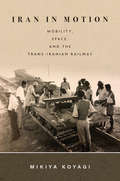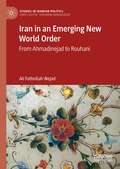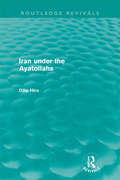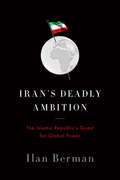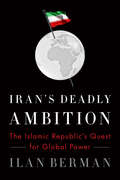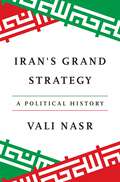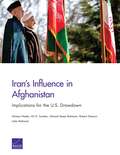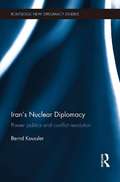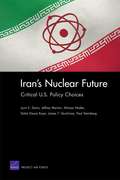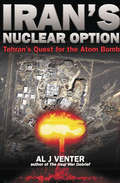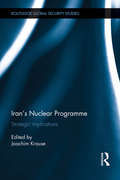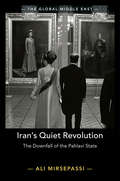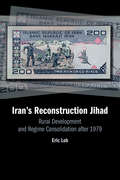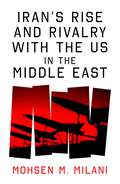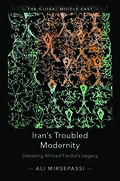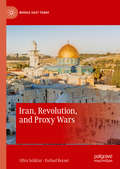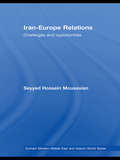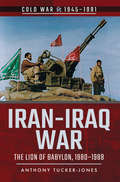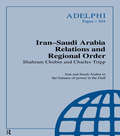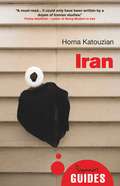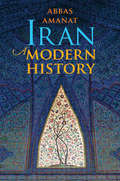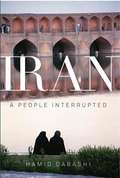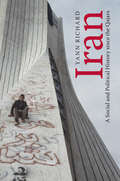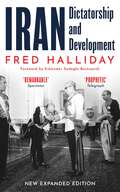- Table View
- List View
Iran in Motion: Mobility, Space, and the Trans-Iranian Railway
by Mikiya KoyagiCompleted in 1938, the Trans-Iranian Railway connected Tehran to Iran's two major bodies of water: the Caspian Sea in the north and the Persian Gulf in the south. Iran's first national railway, it produced and disrupted various kinds of movement—voluntary and forced, intended and unintended, on different scales and in different directions—among Iranian diplomats, tribesmen, migrant laborers, technocrats, railway workers, tourists and pilgrims, as well as European imperial officials alike. Iran in Motion tells the hitherto unexplored stories of these individuals as they experienced new levels of mobility. Drawing on newspapers, industry publications, travelogues, and memoirs, as well as American, British, Danish, and Iranian archival materials, Mikiya Koyagi traces contested imaginations and practices of mobility from the conception of a trans-Iranian railway project during the nineteenth-century global transport revolution to its early years of operation on the eve of Iran's oil nationalization movement in the 1950s. Weaving together various individual experiences, this book considers how the infrastructural megaproject reoriented the flows of people and goods. In so doing, the railway project simultaneously brought the provinces closer to Tehran and pulled them away from it, thereby constantly reshaping local, national, and transnational experiences of space among mobile individuals.
Iran in an Emerging New World Order: From Ahmadinejad to Rouhani (Studies in Iranian Politics)
by Ali Fathollah-NejadThis book critically develops and discusses Iran’s geopolitical imaginations and explores its various foreign-policy schools of thought and their controversies. In doing so, the book covers Iran's foreign policy and international relations from "9/11" all the way to Rouhani’s rise (late 2014). Accounting for both domestic and the international balance of power, the book theorizes the post-unipolar world order of the 2000s, dubbed “imperial interpolarity”, examines Iran’s relations with non-Western great-powers in that era, and offers a critique of the “Rouhani doctrine” and its economic and foreign-policy visions.Forged in the fires and intense deliberations of a PhD, undertaken at a most unique institution of higher learning in the world, Ali Fathollah-Nejad has produced one of the most informative and evocative studies of Iran’s foreign policy and international relations to date. Framed in a highly original theoretical approach, Ali’s nuanced analysis, drawing on a lorry load of primary and secondary sources, details the process and context of policy in the Islamic Republic, thus producing an unrivalled and lasting account of modern Iran’s worldview and the behaviour of this revolutionary state in a fast-changing world.—Anoush Ehteshami, Professor of International Relations & Director of the Institute for Middle Eastern and Islamic Studies, School of Government and International Affairs, Durham University (UK)Empirically rich and theoretically sophisticated, Iran in an Emerging New World Order flashes out the key drivers behind Iran’s international relations since the mid-2000s. Providing evidence for the material and geopolitical significance of Iran’s identity constructions, the book enriches the debate on the Islamic Republic’s foreign policy and bridges the divide between the discipline of IR and area studies.—Fawaz A. Gerges, Professor of International Relations & inaugural Director, LSE Middle East Centre (2010–13), London School of Economics and Political Science (LSE); author of the forthcoming The 100 Years' War for Control of the Middle East (Princeton University Press, 2021).Ali Fathollah-Nejad has established himself as one of the most insightful observers of Iranian politics. Providing the analytical background to his assessments of Tehran’s foreign policy in the 21st century, this book comes out opportunely at a time when a new U.S. administration is about to re-engage with Iran.—Gilbert Achcar, Professor of Development Studies and International Relations, SOAS (School of Oriental and African Studies) University of LondonA decisive contribution to two avant-gardist fields of knowledge: Critical geopolitics and Iranian foreign relations. Anyone interested in cutting-edge research that brings together International Relations and Iranian Studies will revel in this important book.—Arshin Adib-Moghaddam, Professor in Global Thought and Comparative Philosophies, Department of Politics and International Studies & former Chair (2012–18), Centre for Iranian Studies, SOAS University of LondonOne of the few to have a thorough, beyond-the-headlines and forward-looking grasp of Iran, Ali Fathollah-Nejad offers a brilliant analysis of what is in store for Iran. A must-read for anybody interested in geopolitics.—Florence Gaub, Deputy Director & Director of Research, European Union Institute for Security Studies (EUISS), ParisIt is no longer possible to think of any nation-state without simultaneously seeing the reflection of an entire changing world in it. Ali Fathollah-Nejad’s prose and politics in Iran in an Emerging New World Order is the state-of-the-art mapping of the epistemic shift that seeks to understand the global in the local, and the domestic in the foreign. The result is a mode of supple and symbiotic thinking that reveals the way transnational politics dwells on the borderline where the fate of nations unravels into the fold of a dysfunctional diso
Iran under the Ayatollahs (Routledge Revivals)
by Dilip HiroFirst published in 1985, this is a comprehensive study of the Middle East's most strategic country, set against the background of the Islamic heritage of Iran and the rise and fall of the Pahlavi dynasty. Dilip Hiro describes the various phases through which the Islamic revolution has passed, gives an incisive account of the first Gulf War, and provides an historical survey of Iran's relations with the West, the Soviet bloc, and other countries of the region.
Iran's Deadly Ambition
by Ilan BermanAre we on the cusp of détente with Iran? Conventional wisdom certainly seems to believe so. In the aftermath of the interim nuclear deal struck in November 2013 between the Islamic Republic and the P5+1 powers (the United States, France, England, Russia, China and Germany), hopes are now running high for a historic reconciliation between Iran's clerical regime and the West. Yet there is ample reason for skepticism that the United States and Europe can truly curb Iran’s nuclear ambitions by diplomatic means. Moreover, the current focus on Iran’s nuclear program not he part of the Western governments is deeply dangerous, because it fails to recognize--let alone address--Iran’s other international activities, or its foreign policy ambitions. Those objectives reveals Ilan Berman, are global in scope, and they are growing. Iran's Deadly Ambition explains how America's retraction from the Middle East has created significant breathing room for an Iranian regime that not long ago was on the political ropes. Economically, the Islamic Republic is "out of the box" that was erected over the past decade-and-a-half by Western sanctions, thanks to the "interim" nuclear deal. As a result, Iran's leaders are again thinking big about their country and its place in the world. America faces stark choices: to confront Iran's nuclear ambitions andglobal activities, or to accept and accommodate the region's newest hegemon, with all that that portends for American security and the safety of its allies.
Iran's Deadly Ambition: The Islamic Republic's Quest for Global Power
by Ilan BermanAre we on the cusp of détente with Iran? Conventional wisdom certainly seems to believe so. Since the start of diplomacy between the Islamic Republic and the P5+1 powers (the United States, France, England, Russia, China, Germany) in November 2013, hopes have been running high for a historic reconciliation of Iran's clerical regime with the West.Yet there is ample reason for skepticism that the United States and its allies can truly curb Iran's nuclear ambitions by diplomatic means. Moreover, the West's current focus on Iran's nuclear program is deeply dangerous insofar as it fails to recognize-let alone address-Iran's other international activities or its foreign policy aims. Those objectives are global, and they continue to grow in scope and menace.In this sobering book, Ilan Berman illuminates the multiple dimensions of the Iranian threat and exposes the perils of lodging confidence in diplomacy with the Islamic Republic.
Iran's Grand Strategy: A Political History
by Vali NasrFrom the New York Times bestselling author of The Shia RevivalA gripping account that overturns simplistic portrayals of Iran as a theocratic pariah state, revealing how its strategic moves on the world stage are driven by two pervasive threats—external aggression and internal dissolutionIran presents one of the most significant foreign policy challenges for America and the West, yet very little is known about what the country&’s goals really are. Vali Nasr examines Iran&’s political history in new ways to explain its actions and ambitions on the world stage, showing how, behind the veneer of theocracy and Islamic ideology, today&’s Iran is pursuing a grand strategy aimed at securing the country internally and asserting its place in the region and the world.Drawing on memoirs, oral histories, and original in-depth interviews with Iranian decision makers, Nasr brings to light facts and events in Iran&’s political history that have been overlooked until now. He traces the roots of Iran&’s strategic outlook to its experiences over the past four decades of war with Iraq in the 1980s and the subsequent American containment of Iran, invasion of Iraq in 2003, and posture toward Iran thereafter. Nasr reveals how these experiences have shaped a geopolitical outlook driven by pervasive fear of America and its plans for the Middle East.Challenging the notion that Iran&’s foreign policy simply reflects its revolutionary values or theocratic government, Iran&’s Grand Strategy provides invaluable new insights into what Iran wants and why, explaining the country&’s resistance to the United States, its nuclear ambitions, and its pursuit of influence and proxies across the Middle East.
Iran's Influence in Afghanistan: Implications for the U.S. Drawdown
by Robert Stewart Alireza Nader Ali G. Scotten Ahmad Idrees Rahmani Leila MahnadThis study explores Iranian influence in Afghanistan and the implications for the United States after most U. S. forces depart Afghanistan in 2016. Iran has substantial economic, political, cultural, and religious leverage in Afghanistan. Although Iran will attempt to shape a post-2014 Afghanistan, Iran and the United States share core interests: to prevent the country from again becoming dominated by the Taliban and a safe haven for al Qaeda.
Iran's Nuclear Diplomacy: Power politics and conflict resolution (Routledge New Diplomacy Studies)
by Bernd KausslerThis book examines the dynamics of relations and the substance of the negotiations between the international community and Iran over the latter's nuclear programme. Iran’s nuclear programme and the alleged threat to international peace and security remains one of the most important issues in the United States, as well as in European foreign affairs. In the US, Iran has dominated the political discourse for over three decades and Europe has spent considerable political capital in finding a diplomatic solution to Iran’s nuclear ambitions. While relations between both states remain subject to mutual hostility, the EU remains a channel of communication and since 2003 has maintained a multilateral negotiation framework. By and large, the narrative on nuclear negotiations is dominated by constructivist and realist literature, portraying relations between the US and Iran in ideological terms as a prolonged struggle for regional influence. Embedded within conflict resolution and diplomatic theory, this work attempts to bridge this gap. Drawing upon primary documents and interviews, the text examines negotiation behaviour, and strategies and tools of statecraft, as well as analysing technical aspects of initiatives concerning the nuclear programme. This book will be of much interest to students of nuclear proliferation, international diplomacy, Middle Eastern politics, security studies and IR in general.
Iran's Nuclear Future: Critical U.S. Policy Choices
by Lynn E. Davis Alireza Nader Dalia Dassa Kaye Jeffrey Martini James T. QuinlivanAs Iran's nuclear program evolves, U.S. decisionmakers will confront a series of critical policy choices involving complex considerations and policy trade-offs. These policy choices could involve dissuading Iran from developing nuclear weapons; deterring Iran from using its nuclear weapons, if it were to acquire them; and reassuring U.S. regional partners. The U.S. Air Force will need to prepare to carry out whatever policies are chosen.
Iran's Nuclear Option: Tehran's Quest for the Atom Bomb
by Al J. Venter“The most systematic exposition to date about Iran’s nuclear program and its role in world affairs” (Middle East Quarterly).Since the Islamic Republic of Iran admitted that it was secretly producing highly enriched, weapons-grade uranium, nations have struggled to react appropriately. For the first time, and in full detail, this book explains exactly what the Europeans and United Nations have been trying to forestall.Iran could shortly have the ability to strike its immediate Middle Eastern neighbors—and more distant nations—with nuclear weapons. With the size to dominate its region, Iran also has an avowed mission to export its theocratic principles, and in recent decades, has been a notorious supporter of terrorist organizations. Its parallel development of atomic bombs represents the greatest threat to the balance of world power we’ve seen in the new millennium.Here, defense expert Al Venter reveals the extent to which Iran’s weapons program has developed and the clandestine manner in which its nuclear technology has been acquired. He demonstrates how Tehran has violated the Nuclear Non-Proliferation Treaty and details the involvement of several countries shown by the IAEA to have trafficked in illegal nuclear materials. He proves, for the first time, a direct link between the now-defunct South African apartheid regime’s nuclear program and Tehran’s current nuclear ambitions.Venter digs deep into subjects such as Iran’s fervor on behalf of Shiite Islam, its missile program—developed alongside its nuclear one—and the role of the Pasdaran, the Revolutionary Guards, whose tentacles have spread throughout the Middle East and increasingly farther afield. While noting Tehran’s support of terrorist groups such as Hezbollah, Venter follows closely how the Persian homeland itself has progressed toward a strategic nuclear capability that would make recent terrorist attacks look obsolete. Iran’s Nuclear Option is essential reading for anyone with an interest in global security, the perilous volatility of the Middle East, and America’s options, should it be willing and able to counter the threat while time remains.
Iran's Nuclear Programme: Strategic Implications (Routledge Global Security Studies)
by Joachim KrauseThis book examines the strategic implications of Iran’s nuclear programme, providing an inventory of the negotiations and a discussion of possible solutions to this pressing international security issue. The Islamic Republic of Iran’s nuclear programme has been the cause of one of the most extended international crises of the past decade. Multilateral institutions have been unable to resolve the issue, which has the potential to derail the global nuclear non-proliferation regime. Recent failures of diplomatic offers for an extended Iran-EU cooperation and projected US arms sales to Iran’s neighbours suggest an imminent escalation of the issue, which has been simmering since first reports about Iranian nuclear fuel-enrichment activities emerged in 2002. Since then, the topic has been the subject of intense media coverage as well as academic and diplomatic debate. This volume brings together analysts and authors with diverse backgrounds, including international diplomats formerly involved in negotiations with Iranian officials. The various chapters bring together different perspectives and empirical analyses, and include detailed assessments of both US and European efforts in diplomatic relations with Iran, as well as of the domestic politics in Iran itself. This book will be of interest to students of Iranian politics, Middle Eastern politics, strategic studies, nuclear proliferation, international security, foreign policy and IR in general.
Iran's Political Economy since the Revolution
by Suzanne MaloneyOver three decades after the Iranian Revolution reconfigured the strategic landscape in the Middle East, scholars are still trying to decipher its aftereffects. Suzanne Maloney provides the first comprehensive overview of Iran's political economy since the 1979 revolution and offers detailed examinations of two aspects of the Iranian economy of direct interest to scholars and non-specialist readers of Iran: the energy sector and the role of sanctions. Based on the author's research as both a scholar and government advisor, the book also features interviews with American and Iranian government officials. Moving chronologically from the early years under Khomeini, through the economic deprivations of the 1980s during the Iran-Iraq war, through liberalization under Khatami to the present, Maloney offers fascinating insights into Iran's domestic politics and how economic policies have affected ideology, leadership priorities, and foreign relations.
Iran's Quiet Revolution: The Downfall of the Pahlavi State (The Global Middle East #9)
by Ali MirsepassiOffering a new perspective on Iran's politics and culture in the 1960s and 1970s, Ali Mirsepassi challenges the prevailing view of pre-Revolution Iran, documenting how the cultural elites of the Pahlavi State promoted a series of striking 'Gharbzadegi' or 'Westoxification' discourses. Intended as ideological alternatives to modern and Western-inspired cultural attitudes, these influenced Persian identity politics, and projected Iranian modernity as a 'mistaken modernity' despite the regime's own ferocious modernisation programme. Focusing on the cultural transformations which defined the period, Mirsepassi sheds new light on the Pahlavi State as an ideological gambler, inadvertently empowering its fundamentalist enemies and spreading a 'quiet revolution' through secular and religious civil society. Proposing a new theoretical framework for understanding the anti-modern discourses of Ahmad Fardid, Jalal Al-e Ahmad, and Ali Shari'ati, Iran's Quiet Revolution is a radical re-interpretation of twentieth century Iranian political history which makes sense of these events within the creative, yet tragic Iranian nation-making experience.
Iran's Reconstruction Jihad: Rural Development and Regime Consolidation after 1979
by Eric S. LobBased on over one hundred and thirty interviews with government officials, revolutionary activists, war veterans, and development experts, this is the first full length study in English to examine the significant yet understudied organization and ministry, Reconstruction Jihad, as a basis for understanding the political and social changes and continuities that have transpired in the Islamic Republic of Iran (IRI) over the last four decades. Exploring the success of the Iranian revolution, the state's development policies, its overall resilience and the conflicting dynamics of its attempts to mobilize and institutionalize activists, Iran's Reconstruction Jihad is one of the few studies that adopts an institutionalist approach toward analyzing critical aspects of the IRI's history and politics, with comparative implications for analyzing revolutionary processes and outcomes across other geographic regions and time periods.
Iran's Rise and Rivalry with the US in the Middle East
by Mohsen M. MilaniThe 1979 Islamic Revolution triggered a cold war between Iran and the United States – former fast friends. Despite the US&’s relentless efforts at containment, Iran has risen as a formidable power in Iraq, Syria, Lebanon, Yemen, and Gaza. Its newfound status not only frustrates the US but has swiftly become a thorn in the side of Israel and Saudi Arabia. How did Iran rise so rapidly? And as it faces ever increasing pressure at home and abroad, can it hold onto its power? Mohsen Milani guides us through the twists and turns of the Iran–US rivalry in the battlefields of the Middle East. Going from the fall of the Shah to revolutionary Iran&’s alliances with Syria, Hamas, Hezbollah, Iraqi militias, and the Houthis in the Axis of Resistance, Milani lifts the veil on Iran&’s foreign policy strategy and its implications for the region, the US and Iran itself.
Iran's Troubled Modernity: Debating Ahmad Fardid's Legacy (The Global Middle East #5)
by Ali MirsepassiAhmad Fardid (1910–94), the 'anti-Western' philosopher known to many as the Iranian Heidegger, became the self-proclaimed philosophical spokesperson for the Islamic Republic, famously coining the term 'Westoxification'. Using new materials about Fardid's intellectual biography and interviews with thirteen individuals, Ali Mirsepassi pieces together the striking story of Fardid's life and intellectual legacy. Each interview in turn sheds light on Iran's twentieth-century intellectual and political self-construction and highlights Fardid's important role and influence in the creation of Iranian modernity. The Fardid phenomenon was unique to the Iranian story, and yet contributed to a broader twentieth-century Heideggerian tradition that marked the political destiny of other countries under a similar ideological sway. Through these accounts, Mirsepassi cuts to the nerve of how deadly political 'authenticity movements' take hold of modern societies and spread their ideology. Combining a sociological framework with the realities of lived experience, he examines Iran's recent and astonishing upheavals, experiments, and mass mobilizations.
Iran, Revolution, and Proxy Wars (Middle East Today)
by Ofira Seliktar Farhad RezaeiThis book analyzes the historical quest of the Islamic Republic of Iran to export its revolution to the Muslim countries in the Middle East and beyond. The authors argue that Iran exported its revolution by using proxies such as Hezbollah, the Iraqi Shite militias, and the Houthis. The study unravels the casual chain behind less-known cases of Iranian sponsorship of al Qaeda (Central) and al Qaida in Iraq. It combines rigorous theory with detailed empirical analysis which can add to the current debate about ways to roll back Iran’s revolutionary export.
Iran-Europe Relations: Challenges and Opportunities (Durham Modern Middle East and Islamic World Series #6)
by Seyyed Hossein MousavianThis book provides an assessment of relations between Iran and Europe, identifying the areas of common interest as well as the issues of conflict, whilst putting contemporary relations into their proper context with an account of their development since the early years of the twentieth century. Written by a former diplomat who served as the first Iranian ambassador to post-reunification Germany, this book shows that despite the recent deterioration of relations between Iran and the West, Iran has enjoyed a long history of cultural, economic and political ties with many European nations such as Germany. The book explores important historical episodes, including Iran’s support of Germany in the years before the First World War; the burgeoning economic, commercial and scientific co-operation in the interwar years such that by the start of the Second World War Germany was Iran’s leading trade partner; the impact of the Islamic Revolution in 1979; and the attempts by the administration of President Rafsanjani to strengthen ties with Europe in the aftermath of the Iran-Iraq War. Iran-Europe Relations goes on to examine in detail the recent issues of conflict between Iran and Europe: disputes over weapons of mass destruction; allegations of Iranian support for terrorist groups in Afghanistan, Bosnia, Iraq and Lebanon; disagreements over human rights; the Arab-Israeli conflict and the Middle East peace process. It concludes by suggesting ways in which Iran-Europe relations can be encouraged to develop positively, overcome current obstacles and nourish the opportunities and common interests that lie beneath the surface.
Iran-Iraq War: The Lion of Babylon, 1980–1988 (Cold War 1945-1991 Ser.)
by Anthony Tucker-JonesThe bloody eight-year Iran-Iraq war is now almost forgotten, overshadowed by the subsequent Gulf War and Iraq War. However, it is best remembered for the unique so-called ‘Tanker War’ which threatened to strangle the world’s oil supplies. At the time Tucker-Jones as a defence analyst wrote extensively on the war and now brings his expertise to bear with this account of a conflict fuelled by festering regional rivalries, the Cold War and the emerging threat posed by militant Shia Islam. Fought on land, at sea and in the air using some of the most modern weapons money could buy, Western-backed Saddam Hussein’s Sunni Iraq and Shia Iran under the ayatollahs fought themselves to a standstill. Once Saddam’s armoured blitzkrieg had been halted and Iran’s human-wave counterattacks fought off, it became a war of attrition with major battles fought for the possession of Khorramshahr and Basra. Both sides resorted to chemical weapons and bombarding each other with missiles. When the war spilled over into the waters of the Gulf it sparked open Western intervention. Escalating attacks on oil tankers finally culminated in a ceasefire.
Iran-Saudi Arabia Relations and Regional Order (Adelphi series)
by Charles Tripp Shahram ChubinBoth countries will have strong incentives to test the artificial balance established by the US and from which they are excluded. Each state, in the face of continued embargoes, may find the lure of weapons of mass destruction correspondingly increased.
Iran: A Beginner's Guide (Beginner's Guides)
by Homa KatouzianAs the Western-Iranian impasse continues to dominate international affairs, politicians and the media confidently proclaim Iran the greatest threat to the Western World. But this villainous mask obscures a far more complex identity formed by a vibrant and tumultuous history.Revealing the true face of this troubled country, acclaimed expert Homa Katouzian delves deep into Iran's past, exploring how an ancient civilization at a cross-road of diverse dynasties and religions grew to become an ethnically, linguistically and culturally rich nation still bound by the Persian tradition. Major political events and key figures are brought to life as centuries of authoritarian and arbitrary rule, chaos and revolution are unraveled and analyzed, shedding new light on modern Iran and making this an indispensable resource for understanding the current situation in the Middle East.
Iran: A Modern History
by Abbas AmanatA masterfully researched and compelling history of Iran from 1501 to 2009 This history of modern Iran is not a survey in the conventional sense but an ambitious exploration of the story of a nation. It offers a revealing look at how events, people, and institutions are shaped by currents that sometimes reach back hundreds of years. The book covers the complex history of the diverse societies and economies of Iran against the background of dynastic changes, revolutions, civil wars, foreign occupation, and the rise of the Islamic Republic. Abbas Amanat combines chronological and thematic approaches, exploring events with lasting implications for modern Iran and the world. Drawing on diverse historical scholarship and emphasizing the twentieth century, he addresses debates about Iran’s culture and politics. Political history is the driving narrative force, given impetus by Amanat's decades of research and study. He layers the book with discussions of literature, music, and the arts; ideology and religion; economy and society; and cultural identity and heritage.
Iran: A People Interrupted
by Hamid DabashiHamid Dabashi traces the full sweep of Iran's history over the past two centuries and gives an analysis of key events, cultural trends, and political developments up to the collapse of the reform movement and the emergence of the new and combative presidency of Mahmoud Ahmadinejad.
Iran: A Social and Political History since the Qajars (Iran Studies #4)
by Yann RichardFrom encounters with Western powers in the nineteenth century through to a Constitutional Revolution at the beginning of the twentieth century, and from the overthrow of the democratically elected Prime Minister Mosaddeq in the 1950s to the current Islamic Republic, Iran's history has rarely been far from tumultuous and dramatic. And the ways in which Iranian society has participated in and reacted to these events have been equally fascinating and revolutionary. Here for the first time in English, Yann Richard offers his take on the social and political history of Iran since 1800. Richard's account traces the common threads of national ideology and violent conflict that have characterised a number of episodes in Iranian history. By also concerning himself with the reactions and feelings of Iranian society, and by referring frequently to Persian sources and commentaries, Richard gives us a unique insight into the challenges encountered by Iranians in modern times.
Iran: Dictatorship and Development
by Fred HallidayOriginally completed mere months before the Iranian Revolution of 1979, Fred Halliday&’s study of twentieth-century Iran was not only incredibly timely but a deeply researched, thought-provoking work. It masterfully surveys the country&’s uneven capitalist development, state-building and class structure, security and military apparatus, dissent and opposition movements, and foreign relations. Even decades later it remains among the most sophisticated and compelling analyses of this period of Iranian history. Halliday persuasively argues against crude interpretations of the Pahlavi regime as an enlightened and modernising monarchy or merely a dependent client state. Instead, he contends that to make sense of the Pahlavi regime and its vulnerabilities, it is crucial to understand the dialectic of dictatorship, development and the imperial geopolitics of the global Cold War. This new edition also includes six of Halliday&’s essays on the Islamic Republic, demonstrating how his thinking on Iran and the revolution evolved over time.
